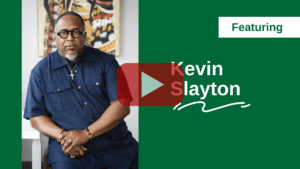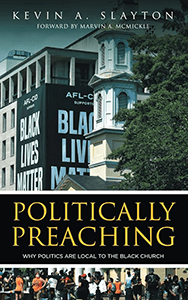
How can church leaders better engage the public sphere and expand their prophetic witness? We speak with Kevin Slayton, a pastor with a passion for public policy and prophetic preaching, about building relationships, engaging in politics, and his book Politically Preaching, Why Politics Are Local to the Black Church.
Listen on Apple Podcasts | YouTube Music | Spotify
Watch on YouTube

Read in-depth interview
- Transcript—Click or Tap to Read
-
Announcer: Leading Ideas Talks is brought to you by the Lewis Center for Leadership of Wesley Theological Seminary in Washington, DC. Subscribe free to our weekly e-newsletter, Leading Ideas, at churchleadership.com/leadingideas.
Leading Ideas Talks is also brought to you by the Taking Church to the Community Video Tool Kit. Explore strategies your congregation can use to reach beyond its walls with worship, community events, ministries, and service. Learn more and watch introductory videos at churchleadership.com/shop.
How can church leaders better engage the public sphere and expand their prophetic witness? In this episode, our guest is Kevin Slayton, a pastor with a passion for public policy and prophetic preaching. He speaks with us about building relationships, engaging in politics, and his book Politically Preaching, Why Politics Are Local to the Black Church.
Jessica Anschutz: Welcome to Leading Ideas Talks, a podcast featuring thought leaders and innovative practitioners. I am Jessica Anschutz, the Assistant Director of the Lewis Center for Church Leadership, and I am your host for this Leading Ideas Talk. Joining me is Kevin Slayton, Pastor of Northwood Appold United Methodist Church, the Campaign Manager at the Maryland Center on Economic Policy, and an Adjunct Professor at Lancaster Theological Seminary.
He is also the author of Politically Preaching: Why Politics Are Local to the Black Church. The focus of our podcast today is the role of the pastor in the public square. Welcome, Kevin. I look forward to our conversation today.
Kevin Slayton: Jessica, thank you and the institute for having me. I look forward to our conversation.
Jessica Anschutz: To kick things off today, I want to lift up a quote from the introduction. You focus on “the need for prophetic preaching and the public square and its potential impact on those living in the shadows of poor policies and tainted governments.” I want to invite you to share with our listeners why this work is important for you.
Kevin Slayton: It is. It’s always been important. More so now than ever, there seems to be a sort of, not just complicit pulpit at work, but one that’s almost absent, and in many ways those issues that often impacted the poor have been hijacked by many on the right. In ways it just really has ignored the day-to-day concerns of people who live on the margins. Those on the right seem to be concerned quite a bit about the wealthy, and those on the left seem to be extremely concerned about those in the middle class. The scriptures that inform us tend to spend most of its time focusing on those who are poor, and I’m concerned that the prophetic voice has sort of taken a time out. As a result, folks from all backgrounds, all races, gender, ideologies, are suffering because our public policies are not reflecting the concerns that people have every day.
Jessica Anschutz: Kevin, in the book, you note that the public sphere is “the most ideal place for engagement and conversation for those who would seek a societal common good.” How can church leaders better engage the public sphere?
Kevin Slayton: I would offer that the first place to start is to become a part of the community.
In many cases, we find—and I have found working on both sides, having worked in public administration, the mayor’s office here as a faith-based liaison—a number of faith communities really don’t know where to enter the conversation. So, it could be issues that are really one of a local matter that sometimes, folks will address them at a state level, or even at a federal level, and not recognize that neither of those offices can do anything to address it.
One is by making yourself aware of the political systems that surround your particular faith institution and particularly at the local level. So, getting an understanding of how local government works, what it can and cannot do, and what your expectations are and what it is you want to receive. So, the first place I would suggest is sort of getting knowledge of the political landscape that surrounds your faith community. If you’re pastoring a church, and you don’t know who your representatives are, then you’re already working from a deficit.
Jessica Anschutz: So once a pastor or other church leader identifies who those folks are, what’s the next step for them?
Kevin Slayton: I think then it’s getting a sense of what the issue is. So, if you know what your issue is, if it’s an issue related to health care, then you need to know who’s working with the health department. If it’s an issue of housing, who’s director of housing this position of homelessness? Who in housing or in that administration is dealing with the issues of homelessness? But really there’s no substitute for being prepared and understanding what it is you want to particularly address. To move forward after that is, is really just detrimental to your cause. In many ways, I think folks have accepted that faith—the voice of the faith community—will be giving instructions. You get the call and say, “Hey, we need people from the faith community to show up on this issue,” and we show up because we’re glad to be invited, but we really have very little knowledge of the issue at hand, or its overall ultimate impact on the people that we serve. So, there’s no substitute for that.
Jessica Anschutz: How would you say that the faith community can better equip themselves to get that information about the issue? What should they be doing?
Kevin Slayton: Sort of using a scriptural reference of Moses: look at what’s in your hand. Really, just taking a look at your congregation and seeing what gifts, skills, talents, networks, and connections are in your pews. You may be very surprised at who has access or who’s actually working on these issues. Very few churches actually have a social action or social justice ministry. They just sort of fly by the seat of their pants as issues come by, but having a prepared group of people working within your congregation because the pastor cannot do everything, can’t be all to everybody, but having them in place to address those issues that’s a great place to start. And I think there are people in our congregations who have these skills and gifts. They’re just waiting to be asked how to use them. So, I think you develop that that ministry within your church and see where that leads.
Jessica Anschutz: I hear you saying that there’s sort of two aspects to this. One is getting to know the community, and the other is getting to know the community within the congregation or the context of the church, and then identify what the needs are and what the gifts are, and how can we best respond and how is God calling us to respond.
Kevin Slayton: I think it’s okay for folks to know you don’t always have to respond especially if you don’t have an understanding of what’s at stake. It’s okay to say, “Can we get back to you?”
Jessica Anschutz: I think that’s really important. People are so—when they’re called upon, they tend to want to respond right away. They don’t always do their homework to get all the information about the issue or whatever they’ve been approached to speak about. In thinking about this as a pastor who has been politically engaged, if you are asked to speak to the media on a particular subject or topic, what are some of the things that you do to prepare yourself for those conversations?
Kevin Slayton: One of the first things I try to do, it’s like preparing for a sermon. They always say if you’re preaching John 3:16, you ought to read at least John 3:15 and John 3:17. So I try and get a sense of the discussion that’s been going on around the issues, trying to identify some of the players, some of the stakeholders—in particular who’s opposing, who’s in opposition, who’s in support. Then reaching out to some of those, depending on the way in which we want to fall, to get a sense of what’s been said, what’s been the action, what’s been the motivations around it. Then—as I teach my students as well—after being armed with that information, taking the theological authority. The request for your voice and your input is truly that they’re seeking a theologian’s perspective.
So, after having that information, then taking that, of course, prayer, and getting a sense of the direction in which you want to speak to. Most often it’s going to be some moral or ethical argument that you want to lift, because the more tangible elements of whatever the issue are, have been raised by other stakeholders that are involved in the discussion. So, getting a grasp of what that is, and then figuring out what the messaging is that should be coming from that faith, from that theological voice, and also assessing if there is an action that needs to be involved with that. Again, working with folks within your ministry, folks that you partner with in community and faith, developing what that message and what that action will look like. Again, all of those things, I think, make for a much more effective introduction into the foray of whatever the issue is.
Explore strategies your congregation can use to reach beyond its walls with worship, community events, ministries, and service. The Taking Church to the Community Tool Kit features engaging videos and presentations and is designed for both self-study and for use with groups in your church. Learn more and watch introductory videos now.
Jessica Anschutz: You referenced, Kevin, the importance of relationships. You highlight this in the book as well. What words of wisdom do you have for church leaders for building and strengthening relationships within their community?
Kevin Slayton: I think the first word that comes to mind is authenticity. You don’t have to try and be something that you aren’t in the community. I think, Jessica, one of the hard things to do is to try and show up on the scene when you’ve been absent so long and assume that you have the authority over the people who have been doing the work. We’ve seen that a lot particularly as there’s been different actions taken throughout the country, whether Chicago, even here in Baltimore. Oftentimes these things happen, and the faith community wants to rush to the front of the line, and they tend to forget that there have been people on the ground working these issues for quite a while.
Another major part of that is people who’ve been working on that issue who are not affiliated with any religious type of leanings. So, they don’t have the same appreciation for your collar or whatever it is you think you bring to the party. So, I think it’s best to enter it sort of naturally—find out who the people are, let them get to know you who you are, and work based on how it is they’re leading you.
Now, if you’re leading the effort, of course, you’re standing in that order is different. But in most cases, working with the community is not something that just happens inorganically. You should have been involved, you know, from some perspective so that they would at least reach out to you. I find that those clergy who are known for that type of community work, they tend to be the “go to.” I’ve been in space, I’ve worked on issues, and I’ve had folks say “well, who is he? Why are we listening to him? Why is he doing that?” Then it’s always affirming to have someone else within the coalition or the body of folks involved to sort of stand up and say “that’s Reverend so-and-so. He’s done this. He’s done that,” and they can authenticate you to the people that you’re working with.
But just show up and create an authentic relationship. Begin to build that trust within those folks that you’re working with. They can trust that if the discussions go one way and leadership says, “oh, we want to take a meeting, but we only want to meet with two or three of you,” and they say, “we want to meet with Reverend so-and-so, blah, blah, blah.” I’ve had that incident happen. They’re like, “we’ve been here for two years working on this issue. Why aren’t they working with us?” Oftentimes you need someone on the inside to sort of give some validation to who this person is, that’s why that is.
But if you haven’t had that relationship, now is the time to start building. Maybe attend community association meetings, make sure that there’s one on your calendar, at least for the ones around you. Host some events, make your space available at least once a quarter. Maybe once a year, that you can feed the community association, let them have their meeting in your space, and then they make the connection with you and that. But again, sort of going in cold and they have no idea who you are, that can be disastrous.
Jessica Anschutz: I can see how that would be disastrous, not only in this context, but in many contexts in ministry, right? The importance of leading authentically out of who we are and who God is calling us to be. In the book, you talk about how all politics are local to the church. I invite you to share with our listeners what you mean by this.
Kevin Slayton: I actually say all politics are local to the Black church. In particular, I take that lead because sort of post the assassination of Dr. King, there has been this sort of parade that we see during the election cycles whereby candidates will make frequent—it’s a part of their campaigns now where they stop in predominantly African American Protestant churches in a way that you don’t see those visits on the campaign trail to mosques, synagogues, or temples. That is because there’s an expectation that within this group is somehow a voice that comes from the pulpit that sort of directs the congregation in which way they should be looking politically. All politics are local. No one comes to a local community and takes on a leadership role or any role without some validation from someone on the inside.
Jessica Anschutz: I know some pastors have been reluctant to engage in politics because they’re worried about jeopardizing the nonprofit status of the church. You address this some in your book, and I’m wondering if you can share with our listeners how to be politically engaged without jeopardizing that status?
Kevin Slayton: I think once you get to 1996, the creation of “Charitable Choice” language, which sort of creates the legal standing to create the unblurring of what we refer to as separation of church and state, which is what most faith organizations try and avoid. The statement in itself alone that I just made shows the significance of that legislation and that language. Prior to 1996, churches were referred to as churches, mosques were referred to as mosques, temples as temples, synagogues as synagogues. Once you have “charitable choice” language, we become referenced as faith-based institutions and what it does, it says that now, faith-based institutions can engage in government sanctioned entities, and receive a financial benefit of this relationship, as long as they agree to do two things. One, not to proselytize, not to try and recruit someone to their faith, and two, not to discriminate against others as it relates to the resources they’ve received. So, if you’re a church and you get grant money to build a daycare, you can’t discriminate against someone who wants to work in the daycare at the church because they’re a Muslim. That is most critical.
But I also, I think the effect of that, as I speak to this, it sort of muted the voice—that prophetic voice—of those in the faith community as well. Because folks are not as inclined now to stand up or stand against visible injustices as a result of not wanting to sort of—not just cross the boundary of that—but I think we live in a day and time where faith institutions now want to be on the good side of empire. So, they know other churches seem to benefit from having those good relationships. As the late Cain Hope Felder would say, we don’t “trouble the waters” anymore for fear of somehow being penalized for that. But rarely are churches sort of called to the mat on these issues or infractions unless it deals with finances. When it comes to the political engagement, everyone knows the churches are not allowed to endorse campaigns, et cetera. But I facetiously say in the text, the book, that historically we know within the Black church—which is my context—that it’s common for politicians to come to church. If you’ve ever been to a Black church, you’ll hear the preacher say these words, “I can’t tell you who to vote for, but I can tell you who I’m voting for.” They’ve found ways to sort of bypass that. But most of those sanctions that folks are trying to avoid, or that they do run up against, tend to do with the improper use of finances.
Jessica Anschutz: I appreciated that you lifted up that too many preachers are concerned with what elected officials think of them rather than what God thinks of them. As a pastor yourself, how do you stay connected with God’s will for you?
Kevin Slayton: It’s…as I’m getting older, it’s not so much about me in that way, it’s about what God would have me to do in this situation. When I’m true to that, I tend to just try and do what I discern the Lord has said through prayer and just through my own conscious and sort of putting aside personal and emotional concerns.
Jessica Anschutz: We have been talking about Politically Preaching: Why Politics are Local to the Black Church by Kevin Slayton. Kevin, I want to invite you to share with our listeners how they can pick up a copy of the book to read it themselves.
Kevin Slayton: You can visit Amazon.com and put in my name and the title of the book, and there you have it. It is pretty easy.
Jessica Anschutz: Great. We will make sure to link to it in the transcript for the podcast so that folks can get it. I want to thank you again, not only for your time with us today, but for the ways in which your faith and witness are speaking out for those who are marginalized and oppressed. As we close our time together today, I want to invite you to share words of encouragement for church leaders who are thinking about taking the next step to engage in local politics.
Kevin Slayton: I would simply say that you should be willing to commit yourselves to the three S’s: If you see something, say something, but be very sure of your faith and your confidence. Because the final S may require that you suffer something. Most people have, in our work, have chosen not to say anything about what they see because they’re not willing to suffer. I think a part of our calling is to suffer. Ministry is dirty work. From the time that God deals with man by putting his hand in the dirt and the dust, it became evident that ministry would be somewhat dirty. So don’t be prepared to suffer. We can’t, I don’t know how much further our nation, or our society will make it, if those who have been called to stand in the gap and to preach and to speak about justice are resigned to the sidelines because they’re afraid to suffer, I think we are in trouble.
Jessica Anschutz: Thank you for that prophetic word and thank you for your time today.
Kevin Slayton: Thank you.
Announcer: Don’t forget to subscribe to our free weekly e-newsletter, Leading Ideas, to be notified when new episodes are published. Visit churchleadership.com/leadingideas.
Politically Preaching: Why Politics Are Local to the Black Church by Kevin Slayton is available at Amazon.
Related Resources
- Pastor as Community Activist featuring Heber Brown, III—Leading Ideas Talks podcast episode | Podcast transcript
- Martin Luther King Jr.’s 4 Key Principles of Prophetic Witness by Tony Hunt
- Leading in an Age of Political Polarization by David R. Brubaker
Photo by Pearl on Lightstock






